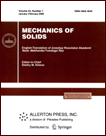 | | Mechanics of Solids
A Journal of Russian Academy of Sciences | | Founded
in January 1966
Issued 6 times a year
Print ISSN 0025-6544
Online ISSN 1934-7936 |
Archive of Issues
| Total articles in the database: | | 13427 |
| In Russian (Èçâ. ÐÀÍ. ÌÒÒ): | | 8178
|
| In English (Mech. Solids): | | 5249 |
|
| << Previous article | Volume 59, Issue 4 / 2024 | Next article >> |
| Zhiyan Feng, Yaoke Wen, Meng Wang, Cheng Xu, Weixiao Nie, Lizhen Wang, and Fangdong Dong, "Multiscale Numerical Simulation of Myocardium Subjected to Blunt Trauma," Mech. Solids. 59 (4), 2492-2508 (2024) |
| Year |
2024 |
Volume |
59 |
Number |
4 |
Pages |
2492-2508 |
| DOI |
10.1134/S0025654424604488 |
| Title |
Multiscale Numerical Simulation of Myocardium Subjected to Blunt Trauma |
| Author(s) |
Zhiyan Feng (School of Mechanical Engineering, Nanjing University of Science & Technology, Nanjing, 210094 China)
Yaoke Wen (School of Mechanical Engineering, Nanjing University of Science & Technology, Nanjing, 210094 China, wenyk@njust.edu.cn)
Meng Wang (Missile Research Institute, Wuhan Guide Infrared Co., Ltd., Wuhan, 430205 China)
Cheng Xu (School of Mechanical Engineering, Nanjing University of Science & Technology, Nanjing, 210094 China)
Weixiao Nie (School of Mechanical Engineering, Nanjing University of Science & Technology, Nanjing, 210094 China)
Lizhen Wang (School of Biological Science and Medical Engineering, Beihang University, Beijing, 100083 China)
Fangdong Dong (Science and Technology on Transient Impact Laboratory, Beijing, 102202 China; No. 208 Research Institute of China Ordnance Industries, Beijing, 102202 China) |
| Abstract |
This study developed a macroscopic finite element model of the human body wearing NIJ III
body armor target against blunt impacts of DBP10 type 5.8 mm rifle bullets and a microscopic representative volume element (RVE) finite element model of myocardial tissue to conduct multiscale
numerical simulations of myocardium under blunt impact effects. Experimental tests on the bullet penetration of ballistic panels were compared with numerical simulations to validate the effectiveness
of the macroscopic finite element model. Uniaxial quasi-static compression tests on sheep hearts were
carried out, and the constitutive parameters of cardiac muscle fibers and connective tissues in the
microscopic RVE model of myocardial tissue were fitted using the inverse finite element method. The
numerical simulation results indicate that in the macroscopic behind armor blunt trauma (BABT)
numerical simulation, the maximum stress in the heart reached 373 kPa, with a maximum nominal
strain of 0.19. The calculated injury score for the heart was 0, indicating no damage. In the microscopic RVE model of myocardial tissue, stress was mainly concentrated in the connective tissue, with
cardiac muscle fibers generally exhibiting higher strains than the connective tissues. Localized areas of
high pressure were observed in the connective tissue, which could compress capillaries in the connective tissue, potentially leading to minor bleeding as indicated by blood pressure values. |
| Keywords |
rifle bullet, BABT, RVE, multiscale, myocardial tissue |
| Received |
03 July 2024 | Revised |
28 August 2024 | Accepted |
30 August 2024 |
| Link to Fulltext |
|
| << Previous article | Volume 59, Issue 4 / 2024 | Next article >> |
|
 If you find a misprint on a webpage, please help us correct it promptly - just highlight and press Ctrl+Enter If you find a misprint on a webpage, please help us correct it promptly - just highlight and press Ctrl+Enter
|
|

 Russian
Russian  English
English